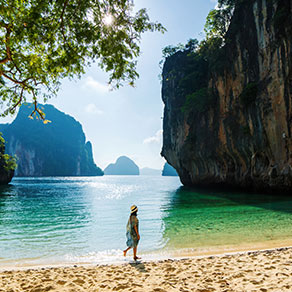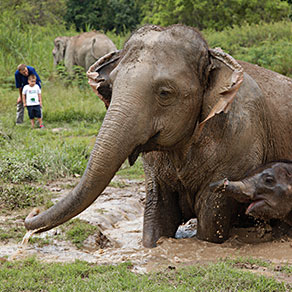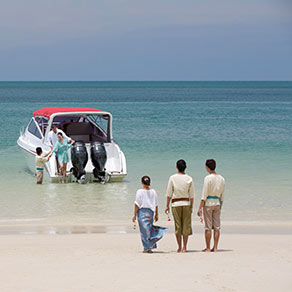The Songkran Festival: Thailand’s Water-Soaked New Year
Celebrated as the traditional Thai New Year, Songkran is one of Thailand’s most significant and best-known annual events.
During Songkran, cities and towns, from the sprawling metropolis of Bangkok to the smallest villages, pulsate with life and energy. Streets, normally bustling with traffic, become pedestrianised arenas for jovial water combatants of all ages. Children gleefully wield their water guns, while adults pour buckets of water from the sidelines or from the beds of their pickup trucks.
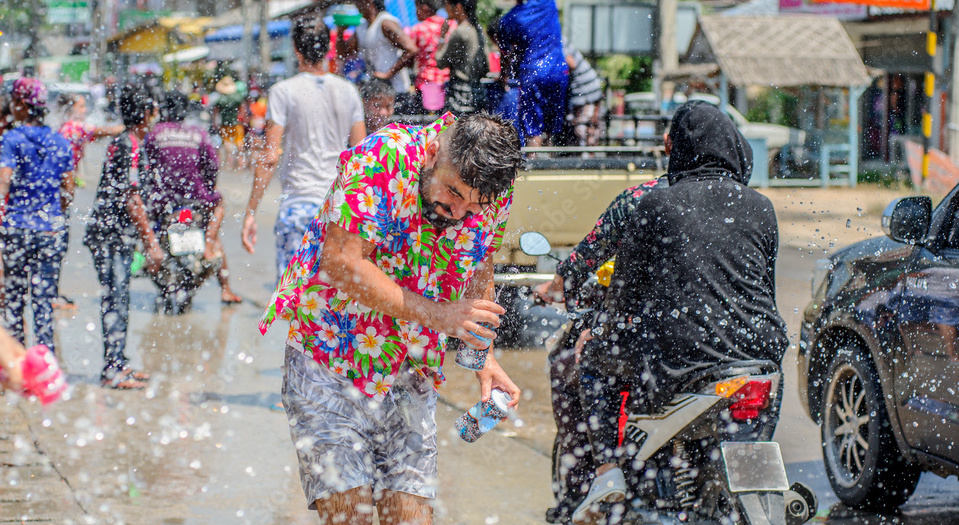
Originating from the Sanskrit word “Sankranti,” denoting a solar event, the festival marks the sun’s transition from one zodiac sign to another, heralding the onset of a new astrological year. Spanning from April 13th to 15th, Songkran converges religious reverence and spirited merriment, blending serene temple visits with spirited water battles on the streets.
Steeped in centuries of tradition, the roots of Songkran can be traced back to ancient Brahmanical customs and Buddhist beliefs. Originally a sombre religious observance, the festival was centred around the ritualistic pouring of water onto Buddha images and elders’ hands, symbolising purification and the washing away of one’s sins and misfortunes.
With time, these symbolic gestures expanded beyond temple walls and familial gatherings, gradually becoming the boisterous water festivities that have become famous today.
Songkran’s timing coincides with the hottest period of the Thai year, making the water play not only culturally significant but also a practical reprieve from the sweltering heat. As the years have progressed, while the large-scale water battles have taken centre stage, many regions in Thailand still maintain and cherish the festival’s more solemn and ancestral rites, providing a poignant reminder of Songkran’s sacred origins. Amid the water-soaked revelry, you’ll also notice lines of people at local temples, offering alms to monks and gently pouring water over sacred Buddha statues—a ritual believed to bestow blessings for the year ahead.
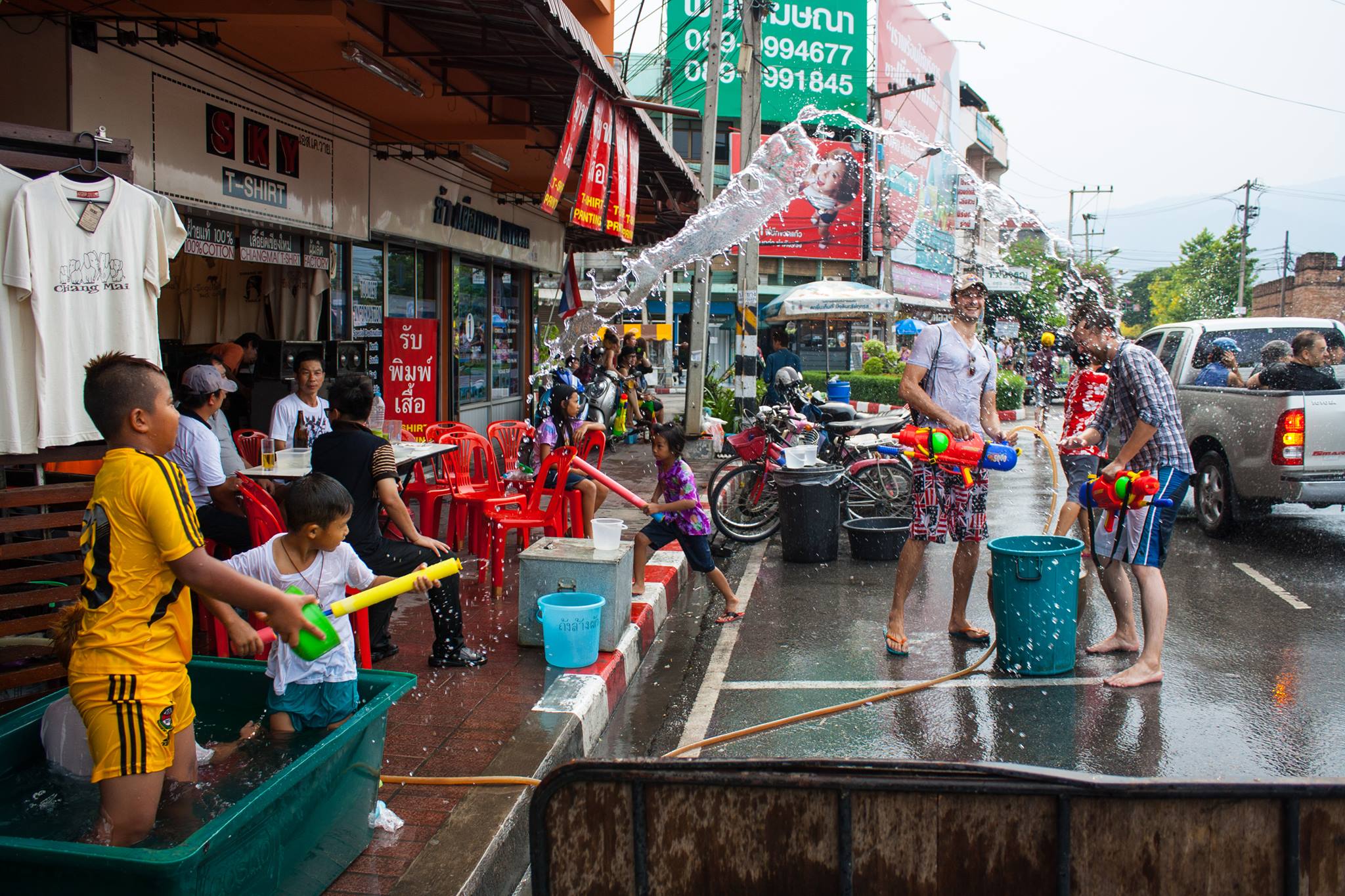
How to get involved with Songkran
Locals generally welcome and encourage respectful participation by visiting foreigners. If you want to get involved all you need to do is step onto the street and you’re likely to get soaked! Simply buy yourself a water gun or find a bucket and join the skirmish.
Although you’ll be welcome to get involved, there are a few important things worth keeping in mind. Remember that despite the fun, this is still a sacred and historical festival. A degree of decorum is expected; dress modestly and observe local customs. Avoid splashing monks, elders, or anyone who seems disinclined.
It’s also worth knowing that in places the festivities can get especially boisterous. You’re likely to get wet, whether you want to or not, so keep any gadgets out of harm’s way, stay hydrated and be cautious when travelling on wet roads. Riding a motorbike or scooter will not make you immune from a youngster with a bucket – in fact as a farang (Westerner) you’ll be a prize target!
Beyond the playful water exchanges, visitors are also welcome to partake in the more traditional aspects of Songkran. Many temples host special ceremonies and invite everyone, regardless of faith, to engage in rituals such as the bathing of Buddha statues.
Our favourite places to experience Songkran
Silom Road, Bangkok: One of the most bustling areas during Songkran, it’s transformed into a pedestrian street with stages, music, and massive crowds armed with water guns. Other boisterous spots in the capital include backpacker hub, Khao San Road, and Central World where they set up large stages with DJs.
In Chiang Mai, often considered the epicentre of Songkran celebrations, the entire old town within the moat is host to major water battles. Expect to get wet, if you want to or not. The city also holds parades and traditional ceremonies.
In Ayutthaya there is a more historical twist to Songkran. Here, you can see elephants being a part of the water splashing, and at Sukhothai there are traditional Songkran celebrations with the backdrop of the famous temples.
The southern town of Nakhon Si Thammarat has a unique drumming tradition during Songkran, and Lampang has horse-drawn carriage parades in addition to the traditional water splashing.
In the lesser-visited Isaan Region in northeastern Thailand, cities like Ubon Ratchathani, Nakhon Phanom, and Khon Kaen have their regional flavours of Songkran, infused with local traditions and rituals, making them ideal for those looking to experience the festival away from tourist hotspots.
YONDER SUGGESTIONS
Yonder is a specialist India tour operator, including tailor-made, luxury holidays to Thailand which can include any of the must see places discussed in this article.
All Yonder itineraries are crafted on a tailor-made, one-off basis, so you can be sure that your holiday will be as individual as you are.
Celebrated as the traditional Thai New Year, Songkran is one of Thailand’s most significant and best-known annual events.
During Songkran, cities and towns, from the sprawling metropolis of Bangkok to the smallest villages, pulsate with life and energy. Streets, normally bustling with traffic, become pedestrianised arenas for jovial water combatants of all ages. Children gleefully wield their water guns, while adults pour buckets of water from the sidelines or from the beds of their pickup trucks.

Originating from the Sanskrit word “Sankranti,” denoting a solar event, the festival marks the sun’s transition from one zodiac sign to another, heralding the onset of a new astrological year. Spanning from April 13th to 15th, Songkran converges religious reverence and spirited merriment, blending serene temple visits with spirited water battles on the streets.
Steeped in centuries of tradition, the roots of Songkran can be traced back to ancient Brahmanical customs and Buddhist beliefs. Originally a sombre religious observance, the festival was centred around the ritualistic pouring of water onto Buddha images and elders’ hands, symbolising purification and the washing away of one’s sins and misfortunes.
With time, these symbolic gestures expanded beyond temple walls and familial gatherings, gradually becoming the boisterous water festivities that have become famous today.
Songkran’s timing coincides with the hottest period of the Thai year, making the water play not only culturally significant but also a practical reprieve from the sweltering heat. As the years have progressed, while the large-scale water battles have taken centre stage, many regions in Thailand still maintain and cherish the festival’s more solemn and ancestral rites, providing a poignant reminder of Songkran’s sacred origins. Amid the water-soaked revelry, you’ll also notice lines of people at local temples, offering alms to monks and gently pouring water over sacred Buddha statues—a ritual believed to bestow blessings for the year ahead.

How to get involved with Songkran
Locals generally welcome and encourage respectful participation by visiting foreigners. If you want to get involved all you need to do is step onto the street and you’re likely to get soaked! Simply buy yourself a water gun or find a bucket and join the skirmish.
Although you’ll be welcome to get involved, there are a few important things worth keeping in mind. Remember that despite the fun, this is still a sacred and historical festival. A degree of decorum is expected; dress modestly and observe local customs. Avoid splashing monks, elders, or anyone who seems disinclined.
It’s also worth knowing that in places the festivities can get especially boisterous. You’re likely to get wet, whether you want to or not, so keep any gadgets out of harm’s way, stay hydrated and be cautious when travelling on wet roads. Riding a motorbike or scooter will not make you immune from a youngster with a bucket – in fact as a farang (Westerner) you’ll be a prize target!
Beyond the playful water exchanges, visitors are also welcome to partake in the more traditional aspects of Songkran. Many temples host special ceremonies and invite everyone, regardless of faith, to engage in rituals such as the bathing of Buddha statues.
Our favourite places to experience Songkran
Silom Road, Bangkok: One of the most bustling areas during Songkran, it’s transformed into a pedestrian street with stages, music, and massive crowds armed with water guns. Other boisterous spots in the capital include backpacker hub, Khao San Road, and Central World where they set up large stages with DJs.
In Chiang Mai, often considered the epicentre of Songkran celebrations, the entire old town within the moat is host to major water battles. Expect to get wet, if you want to or not. The city also holds parades and traditional ceremonies.
In Ayutthaya there is a more historical twist to Songkran. Here, you can see elephants being a part of the water splashing, and at Sukhothai there are traditional Songkran celebrations with the backdrop of the famous temples.
The southern town of Nakhon Si Thammarat has a unique drumming tradition during Songkran, and Lampang has horse-drawn carriage parades in addition to the traditional water splashing.
In the lesser-visited Isaan Region in northeastern Thailand, cities like Ubon Ratchathani, Nakhon Phanom, and Khon Kaen have their regional flavours of Songkran, infused with local traditions and rituals, making them ideal for those looking to experience the festival away from tourist hotspots.
YONDER SUGGESTIONS
Yonder is a specialist India tour operator, including tailor-made, luxury holidays to Thailand which can include any of the must see places discussed in this article.
All Yonder itineraries are crafted on a tailor-made, one-off basis, so you can be sure that your holiday will be as individual as you are.

 USD
USD
